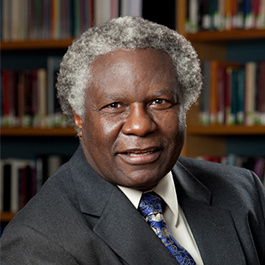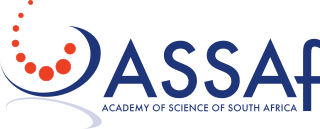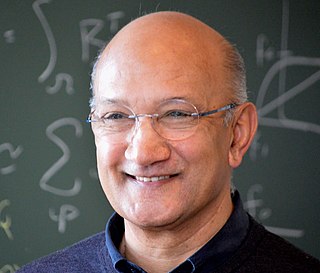Related Research Articles
The Royal Academies for Science and the Arts of Belgium (RASAB) is a non-governmental association that promotes and organises science and the arts in Belgium by coordinating the national and international activities of its constituent academies such as the National Scientific Committees and the representation of Belgium in international scientific organisations.

Calestous Juma was a Kenyan scientist and academic, specializing in sustainable development. He was named one of the most influential 100 Africans in 2012, 2013 and 2014 by the New African magazine. He was Professor of the Practice of International Development and Faculty Chair of the Innovation for Economic Development Executive Program at Harvard Kennedy School. Juma was Director of the School's Science, Technology and Globalization Project at Harvard Kennedy School as well as the Agricultural Innovation in Africa Project funded by the Bill and Melinda Gates Foundation.

The Organization for Women in Science for the Developing World (OWSD) is an international organisation that provides research training, career development and networking opportunities for women scientists throughout the developing world at different stages in their career. It was founded in 1987 and was officially launched in 1993. The organisation was formerly known as the Third World Organization for Women in Science (TWOWS). It is a program unit of UNESCO and based at the offices of The World Academy of Sciences in Trieste, Italy.

The Academia Europaea is a pan-European Academy of Humanities, Letters, Law, and Sciences. The Academia was founded in 1988 as a functioning Europe-wide Academy that encompasses all fields of scholarly inquiry. It acts as co-ordinator of European interests in national research agencies.
The American Society for Cell Biology (ASCB) is a professional society that was founded in 1960.
Ratemo Michieka is currently the Chancellor of Tharaka University and former director-general of the National Environmental Management Authority (NEMA) in Kenya; he is also the founding Vice-Chancellor of Jomo Kenyatta University of Agriculture and Technology.

Computer Society of India is a body of computer professionals in India. It was started on 6 March 1965 by a few computer professionals and has now grown to be the national body representing computer professionals. It has 72 chapters across India, 511 student branches, and 100,000 members.

The Academy of Science of South Africa (ASSAf) is the national science academy in South Africa. It was started in 1996, and encompasses all fields of scientific work. Its legal foundation is the Academy of Science of South Africa Act, Act 67 of 2001, which came into operation in May 2002.

The Commission on Science and Technology for Sustainable Development in the South (COMSATS) is an inter-governmental organization, having a membership of 27 developing countries from three continents, Latin America, Africa and Asia. Twenty-five S&T/R&D institutions of developing countries are affiliated with COMSATS as members of its Network of International S&T Centers of Excellence for Sustainable Development in the South. The organization aims at sustainable socio-economic uplift of the developing countries through scientific and technological means while adopting North–South and South–South cooperation.
Goverdhan Mehta is an Indian researcher and scientist. From 1998-2005 he was the director of the Indian Institute of Science (IISc). Previously from 1977-1998, Mehta was a professor of chemistry and vice-chancellor at the University of Hyderabad. Mehta has authored over 550 research papers.
Ivan Addae-Mensah, is a Ghanaian chemist and university administrator who served as the Vice-Chancellor of the University of Ghana, Legon from 1996 to 2002. He is an Emeritus Professor of Chemistry at the same institution. He is a Life Fellow of the Royal Society of Chemistry, Fellow of the Ghana Academy of Arts and Sciences and a Fellow of the Ghana Chemical Society.
Science and technology in Uganda refers to the growth within the technological industry in response to government efforts to develop a national innovation system, as well as any subsequent socioeconomic and cultural impacts of these endeavours.

Olanike Kudirat Adeyemo is a Nigerian professor of veterinary public health and preventive medicine at the University of Ibadan. She was inaugural deputy vice chancellor, research, innovation and strategic partnership, University of Ibadan, from 2017 to 2021. Since July 2023 she has been Secretary to the State Government of Oyo.

Thomas M. Kariuki is a Kenyan biologist who is Chief Executive Officer of the Science for Africa Foundation. Kariuki previously served as the Director of Programmes for the Alliance for Accelerating Excellence in Science in Africa (AESA). He was the Director of the Institute of Primate Research/National Museums of Kenya, for seven years. Kariuki’s research interests have spanned the immunology of neglected infectious diseases and he has been involved in global efforts to develop vaccines, drugs and diagnostics for poverty-related diseases. He has published on vaccines and diagnostics development for schistosomiasis (Bilharzia), malaria and co-infections and on policy issues related to biomedical research and funding. He is a Fellow of the African Academy of Sciences (AAS), Senior Fellowship of the European Foundations Initiative for Neglected Tropical Diseases, Presidential honour of the Order of Grand Warrior of Kenya (OGW) for scientific leadership and public service, Honorary Professor of Research of the Liverpool School of Tropical Medicine, LSTM.

The Academy of Sciences Malaysia is a statutory body in the Malaysian government established under an act of Parliament. The Academy, abbreviated as ASM, is the highest scientific advisory body of Malaysia, and is organizationally under the Ministry of Science, Technology and Innovation (MOSTI).
The Fisheries Society of Bangladesh (FSB) is the oldest and the largest non-profit scientific society for fisheries professionals in Bangladesh. Established in 1977, the society serves as a platform for professionals, educators and researchers in the fisheries and aquaculture sector to collaborate, share knowledge and contribute to the sustainable development of the sector in the country. The FSB also collaborates with government agencies, academic institutions and international organizations to promote sustainable practices and capacity-building initiatives.

Batmanathan Dayanand (Daya) Reddy is a South African scientist. He is Professor Emeritus of Applied Mathematics and served as interim Vice Chancellor (President) at the University of Cape Town between March 2023 and July 2024. Reddy held the South African Research Chair in Computational and Applied Mechanics from 2007 to 2021, and is a former director of the Centre for Research in Computational and Applied Mechanics (CERECAM) there. From 2018 to 2021, he was the inaugural president of the International Science Council.
The National Academy of Engineering of Korea is a Korean nonprofit, non-governmental organization founded to support engineering and technology development in academia, industry, and national institutions; and to contribute to the development and sustainable development of engineering technology through academic research. The Academy was founded in 1996 in accordance with Article 40 of the Industrial Technology Innovation Promotion Act.
The Zambia Academy of Sciences (ZaAS) is a non-profit organisation that provides perspectives on scientific matters and contributes to the nation's scientific education. It includes 42 members and fellows from various scientific disciplines, including academia, public and private sectors. The academy has a draft constitution and is subject to an Act of Parliament.
The Zimbabwe Academy of Sciences (ZAS) is a national academy of sciences in Zimbabwe, formed in 2004 by the Research Council of Zimbabwe (RCZ). It addresses subjects such as tropical resources, ecology, and environmental and climate studies. The academy is affiliated with the InterAcademy Partnership and the Network of African Science Academies.
References
Citations
- 1 2 "STIR BULLETIN VOLUME 4, JULY TO SEPTEMBER 2021" (PDF). Retrieved 27 December 2023.
- ↑ "Brief History". Kenya National Academy of Sciences. 2 November 1983. Retrieved 27 December 2023.
- 1 2 3 "About the Academy". knas.or.ke. Retrieved 27 December 2023.
- ↑ Aduda & Kenya National Academy of Sciences 2006, p. 4.
- ↑ "Kenya, National Commission for Science, Technology and Innovation (NACOSTI)". International Science Council. 26 September 2022. Retrieved 27 December 2023.
- ↑ Amakhosi Theatre 1994, p. 7.
- ↑ "Fellows and Members". Kenya National Academy of Sciences. 2 November 1983. Retrieved 27 December 2023.
- ↑ Profiles of Fellows and Members (PDF) (Report) (2nd ed.). Nairobi, Kenya: Kenya National Academy of Sciences. 2022. ISSN 0250-8265. Archived (PDF) from the original on 17 February 2024. Retrieved 24 February 2024.
- 1 2 3 4 "Kenya National Academy of Sciences". International Year of Basic Sciences for Development. Retrieved 27 December 2023.
Bibliography
- Aduda, B.O.; Kenya National Academy of Sciences (2006). Science and Technology Capacity in the Framework of Millennium Development Goals: Proceedings of the National Workshop in Commemoration of the Scientific Revival Day of Africa. Kenya National Academy of Sciences. Retrieved 27 December 2023.
- Amakhosi Theatre (1994). Nomdlalo: Township Theatre News. Amakhosi Theatre. Retrieved 27 December 2023.